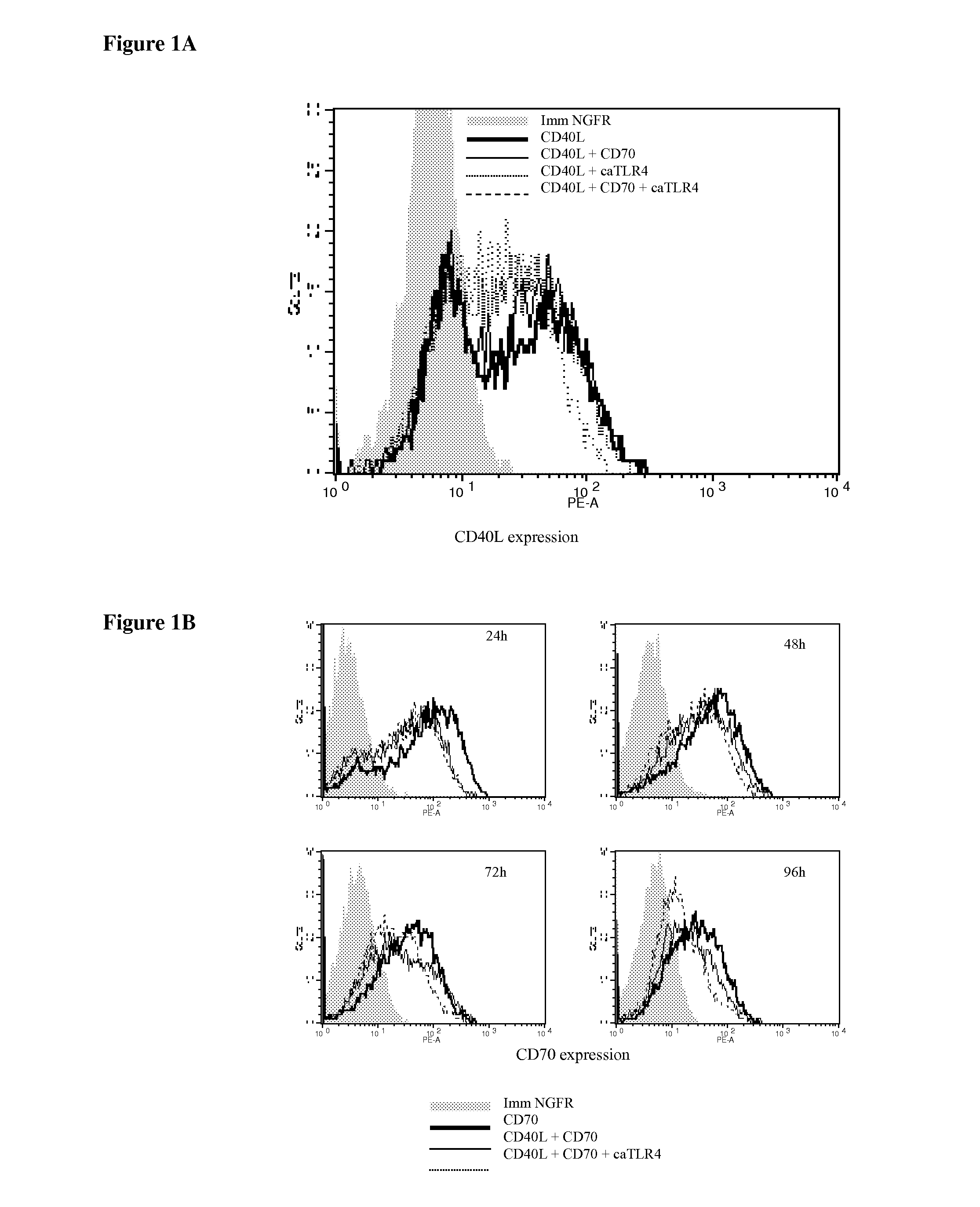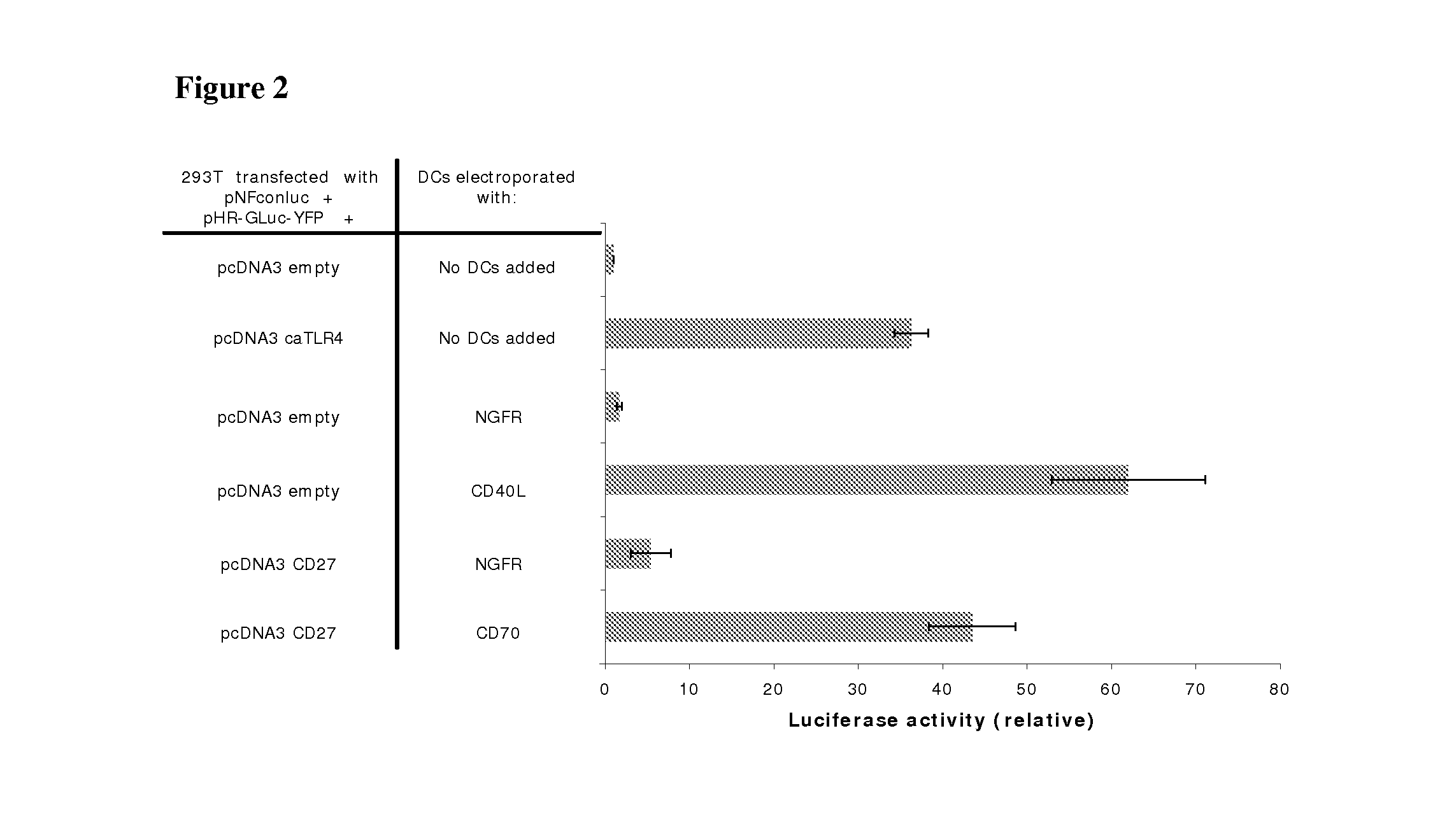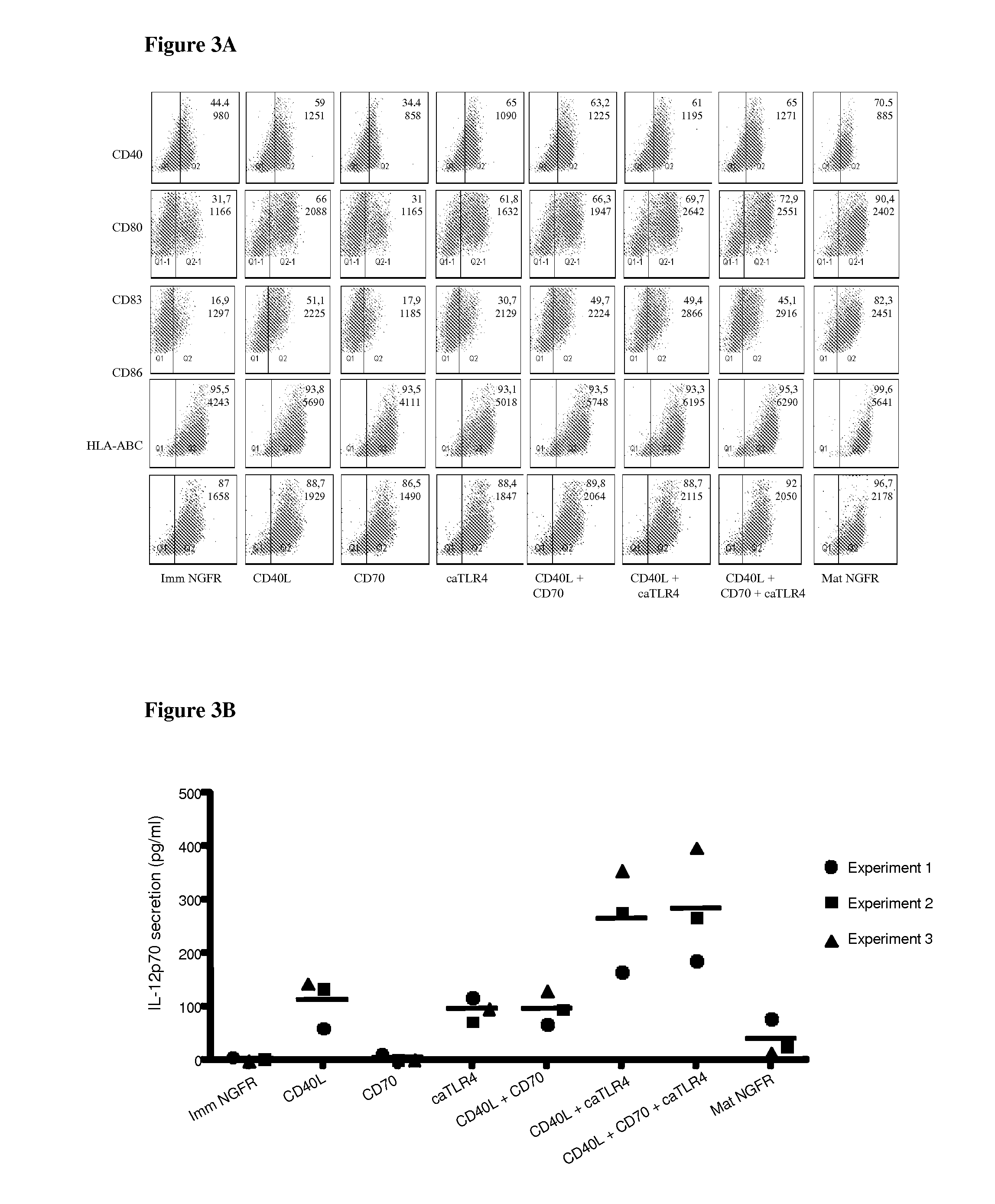Enhancing the T-cells stimulatory capacity of human antigen presenting cells and their use in vaccination
a technology of human antigen presenting cells and stimulatory capacity, which is applied in the field of immunotherapy, can solve the problems of insufficient elicitation of strong immune responses in vitro and in vivo, insufficient antigen-presenting cells (apcs), and insatiable immunological responses and clinical outcomes so far
- Summary
- Abstract
- Description
- Claims
- Application Information
AI Technical Summary
Benefits of technology
Problems solved by technology
Method used
Image
Examples
example 1
Generating Immature Dendritic Cells from Patient Blood Mononuclear Cells (PBMCs)
[0114]Day 0: In vitro manipulation of PBMCs: after the patient underwent a leukapheresis in order to obtain a significant number of PBMCs, the leukapheresis product is thoroughly washed and subsequently seeded into cultivation chambers to allow them to adhere to the plastic of the chambers for two hours at 37° C., in the appropriate medium, such as X-VIVO medium, supplemented with 1% autologous plasma, previously obtained from the same patient. After these two hours, the cultivation chambers are washed with e.g. phosphate saline buffer (PBS) in order to remove the non-adherent cells. The adherent cells in turn are further cultivated in culture medium comprising dendritic cell differentiation factors such as GM-CSF (in a concentration of about 1000 U / ml) and IL-4 (in a concentration of 500 U / ml) in an appropriate medium (e.g. RPMI1640) supplemented with 1% autologous patient plasma.
[0115]Day 2 and 4: On d...
example 2
Modifying the Obtained Dendritic Cells Such that they Express Both a Tumorantigen Derived Peptide and the CD40L, CD70 and TLR4 Immunostimulatory Factors to Obtain an Anti-Tumor Vaccine
Materials and Methods:
Genetic Constructs.
[0118]The cloning of the pGEM4Z-NGFR plasmid encoding a truncated form of the nerve growth factor receptor (extracellular and transmembrane fragment) has previously been described. CD40L was amplified from activated CD4+ T cell cDNA with the following primers: CD40LS 5′-GATGGATCCGTCATGATCGAAACATACAAC-3′ (SEQ ID NO:3) and CD40LAS 5′-GCT CGGTACCCATCAGAGTTTGAGTAAGCC-3′ (SEQ ID NO:4) and was inserted in the pGEM4Z-A64 plasmid (kindly provided by Dr. N. Schaft, Department of Dermatology, University Hospital of Erlangen, Germany) as a BamHI-KpnI fragment. CD70 was amplified from the pIRESneo2-CD70 plasmid (a kind gift from Dr. S. Iwamoto, Department of Biochemistry, Showa University, Japan) with the following primers: CD70S 5′-AAAAGCTTCCACCATGCCGGAGGAGGGTTC-3′ (SEQ ID...
example 3
Testing the Immunostimulatory Effect of the Obtained Anti-Tumor Vaccine In Vitro
Materials and Methods:
Activation of the NF-kappaB Pathway.
[0125]The genetic constructs used were as follows: the pNFconluc plasmid encoding the firefly luciferase gene driven by a minimal NF-kappaB-responsive promoter was kindly provided by Dr. R. Beyaert (VIB, Ghent University, Belgium). The CSCW-GLuc-YFP plasmid, encoding the humanized secreted Gaussia luciferase fused to yellow fluorescent protein was a kind gift from Dr. B. A. Tannous (Massachusetts General Hospital, Boston, Mass.). The GLuc-YFP was subcloned from this plasmid into the pHR-vector. CD27 was amplified from EBV-B cell cDNA with the following primers: CD27S 5′-AA AAAGCTTCCACCATGGCACGGCCACATCCCTG-3′ (SEQ ID NO:1) and CD27AS 5′-CCCCTCGAG TCAGGGGGAGCAGGCAGG-3′ (SEQ ID NO:2) and was inserted in the pcDNA3 vector as a HindIII-XhoI fragment.
[0126]For NF-kappaB luciferase assay, 293T cells (1×105 cells per well) were seeded in 24 well plates. A...
PUM
| Property | Measurement | Unit |
|---|---|---|
| resistance | aaaaa | aaaaa |
| capacitance | aaaaa | aaaaa |
| voltage | aaaaa | aaaaa |
Abstract
Description
Claims
Application Information
 Login to View More
Login to View More - R&D
- Intellectual Property
- Life Sciences
- Materials
- Tech Scout
- Unparalleled Data Quality
- Higher Quality Content
- 60% Fewer Hallucinations
Browse by: Latest US Patents, China's latest patents, Technical Efficacy Thesaurus, Application Domain, Technology Topic, Popular Technical Reports.
© 2025 PatSnap. All rights reserved.Legal|Privacy policy|Modern Slavery Act Transparency Statement|Sitemap|About US| Contact US: help@patsnap.com



